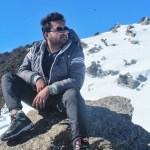Vox Populi brings to you the second edition of the series Campus Blueprints: The Journey of Unmukt. We interviewed one of the founders of Unmukt, Manish Gautam, and few of the most active volunteers, Ayush Mukherjee, Aditya Bansal, Ranjith Jaganathan, to bring to you an overview of how Unmukt was able to evolve over the years, the work that has been accomplished by Unmukt, and how, as a club, it propagates the awareness of the LGBTQ+ community in our campus. Read on to find out more about it!
Laying the foundations of Unmukt
The idea to start Unmukt wasn’t formally taken into account. It was around February 2013 when, in a casual conversation with Amrita Arya, Manish realized that IITK had no student body working for voicing the issues of the LGBTQ community. While several other colleges including IIT Bombay had verticals dedicated to their welfare. Being an alumnus, the initial task was to reach out to people on the campus. Someday in July 2013, an open discussion on the topic gathered countable faculty members and students who vehemently embraced the initiation of such a body. Prof. Suchitra Mathur and Prof. Junaki Sen enthusiastically joined in and guided the members. Several volunteers then made their way towards working actively for this cause. Until it became a club, Unmukt organised a few informal unstructured events which later on gained grounds and accentuated to mark the beginning of a successful initiative.
Around 2014, after several senior working members graduated, the activities of the group significantly reduced and it remained inactive for long. Ayush came to be associated with Unmukt in 2016, learning in the process that it had an informal history in which members preceding him discussed gender and sexuality-related issues. In 2016, Unmukt finally became a part of the Community Welfare Cell, under the presidency of Ashutosh Ranka. Ayush, being anointed as the overall coordinator, started off to revive the club’s activities. The agenda was laid out, they built on the definition of gender and sexuality and started putting their interpretations to it. With all the input, Unmukt was clearly defined in the context of Students’ Gymkhana.
Overcoming the obstacles during the early days
Unmukt, being initiated on a completely different concept, had limited people working for it. Thus, several initiatives had to be kick-started to revive the club’s existence and draw people’s attention. However, the cycle of organising events without members and expecting members without undertaking events was iterative. Also, given the general stigma surrounding this issue, conducting events which could easily draw a significant crowd was a huge challenge. The main task was to normalise people with the conversation and make them assess the situation. All of these efforts invited both criticism and consent. While it was affirmed to become a club, several people were enthralled on the thought that the notion of gender diversity would finally be informally addressed and talked about. On the other side, there also came questions on the vision of Unmukt and the need for a gender and sexuality club on campus. This is something that Unmukt still struggles with. Ayush classifies this as a two-pronged problem, one in terms of ideology and others in terms of practice.
Garnering support on campus
When it came to volunteers, CWC’s most active club, Prayas, had people turning up in good numbers, but this participation was intermittent. Although both our interviewees remain dubious about this non-participation persisting on just our campus, they acknowledge that it always remains challenging to get volunteers for any social cause. Following this, Unmukt had just four members in January 2017. But this less participation did not prove to be a setback and the team instigated its activities with complete motivation. They started by researching and gathering knowledge before taking the issues out to the campus. After a few months, they began circulating and re-circulating forms. Thereby, with the involvement of more people, things progressed more efficiently. Though the response from the campus students was never sufficient, and even now, they do not have more than 60-70 members. At times, the work was even ridiculed by the people. A lot of members did not take that well; some were even personally targeted. But over the years, as a positive surprise, the campus community has come to accept Unmukt and what it stands for.
Activities: Engaging the community
The team back then initiated activities that involved less effort and had a greater impact. The aim was primarily to acquaint people with the initiative and motivate them to engage and contribute to the same. A couple of open meets were conducted, and the team worked with the ELS to organize some themed competitions. A campaign was deployed in collaboration with other IITs and IIMs during the summers. The team interviewed several people, which made them reach out to the campus junta and uphold their participation. Apart from being socially active, other reading and discussion groups were also operated regularly. But despite such efforts, most of the activities didn’t gain attention. This was even worsened by the cancellation of Melange, a presidential council festival which was organised every year and hosted multiple competitions. After Melange wasn’t brought into action, the plans of conducting events as a part of it were completely obliterated.
“Queen-size” Event
“Queen Size” is a choreographic exploration that takes the form of a detailed study of the intimacy between two men. Played out on a ‘charpoy bed’, the duet makes an embodied argument for the fundamental right to love. In deliberately making this encounter visible, Queen-size poses questions around spectatorship, privacy, and dissent. It explores the intricacies of desire and physical intimacy.
In one of the courses that Ranjith took up, Professor Suchitra Mathur asked students to derive the literary comparison and themes between two plays. One of the plays presented was Queen Size. The one who presented the idea of this play approached the queen size team and asked whether they can do the play in IITK. The request was then forwarded to the Unmukt team and they took the charge of conducting the event “Queen Size” for campus janta! However, Aditya pointed out that initially the team was highly strung on how it will be carried out, what to present on the poster and whether or not admin would give the permission to carry out this play.
They wrote a letter to DoSA and got it signed by the faculty advisor which was then Prof. Suchitra Mathur. The student gymkhana was requested to forward the email notifying campus janta of this event and the faculty advisor to all the professors.
For this particular event, the volunteers were asked to distribute a piece of paper at the exit gate which had the printed content of the theme of this play. The Unmukt team printed out around 50 posters. The campus janta turned out in good numbers, making the event eminent.
Path to a forum for free expression
A large part of what Unmukt talks about is Representation. Over the years, it has tried to create awareness to understand our own selves and dispel the rigidity of expressing who we are. However, it wasn’t easy to eradicate the stigma surrounding it. The need was to stay attentive to all such issues on campus; to look for, identify and address them. Unmukt started by making forums where people could discuss all such problems without any fear of being judged. Also, there were plans to conduct surveys to understand the diversity on the campus and reach everyone at the same time. But those surveys couldn’t be undertaken despite much discussion. The team also thought to work as a support group for the campus community, but the idea had its pros and cons and invited conflicts. Though, despite every such struggle, Unmukt evolved as a platform to address the notion of gender and sexual diversity while encouraging everyone to recognise, accept and admire themselves the way they are.
Transformation of Unmukt and its current state
Ayush states that in some aspects, he didn’t envision the club to be the way it is now. The focus currently is less on the campus and more towards the outside world. Being a student of IITK, he feels it to be a responsibility to stay attentive to issues of campus junta first and then talk about the outside world. Emphasising on this point, he says,
‘Though the work accomplished by the current members of Unmukt is laudable, the tasks carried out by the team, at a certain time, must be contextualised to what is happening immediately around us. The thought should be on how we should envision a broader and more familiar idea of the community into the workings of our own small-scale groups.‘
Manish, on the other hand, points out the need to work on a greater level, stating,
‘Though the progress has been good, I am unsure of how sensitive and reachable the club has been to the issues prevalent in society i.e. outside the campus. Thus, a proper and ubiquitous addressal is fairly needed. And to reciprocate in a better way, the team should be confident enough to interact and dynamic enough to cover up the loopholes in the club’s functioning.’
While on the other side, he expresses his delight in the way the club has functioned and progressed in changing the sceptic outlook of the society. The campus has now transformed to become more open and non-judgemental. He assures that the club is meant to strive even further and stay as an ally to every single person on campus. He also affirms to support every decision taken by members and guide them throughout.
Unforgettable experiences of Ayush and Manish
Ayush mentions that the time spent as a part of Unmukt has been memorable. Amongst all the other activities, the most engaging part was taking interviews. For the most part, they used to stick to gender-based interviews and did not go too subjectively sexually in interviews and the kind of stories they came across through these interviews were inspiring and memorable.
Being remotely involved in the club, Manish admits that there wasn’t anything dramatic an experience which he faced. Everything went on smoothly without any hassles.
A long-lasting bond with Unmukt
Being one of the early members of Unmukt, Ayush still ushers and lends his services for it. Although guiding in his opinion is more of an authoritative relationship, which has been problematic for the club in the past. However, he remains approachable to all the club members and helps them whenever needed. On the progress so far, he remarks,
‘By far, the initiatives taken in the cultural domain are appreciable. The interactive activities carried out and the ideas shared by the current and past members of the team are the most refreshing aspects of the working. While functioning under the domain of awareness, the aim should be to better understand the historical and political positions of a person, to always look for effective ways of conversing, and to remember the importance of communication.’
While stating the same, Manish also attributes the club’s progress to the continuous efforts of present and former members and adds that the seniors aren’t meant to tell the team how to do things, even as a part of the guidance. He appreciates the progress till date, from enrolling more volunteers to organising events related to LGBT issues and spreading the required awareness, he is optimistic with where the club is heading.
Writers: Aaryan Mehar, Ananya Gupta, Astha Pant, Namgyal Lhamo Dolma, Sandipan Mitra
Editor: Sarvesh Bajaj














































